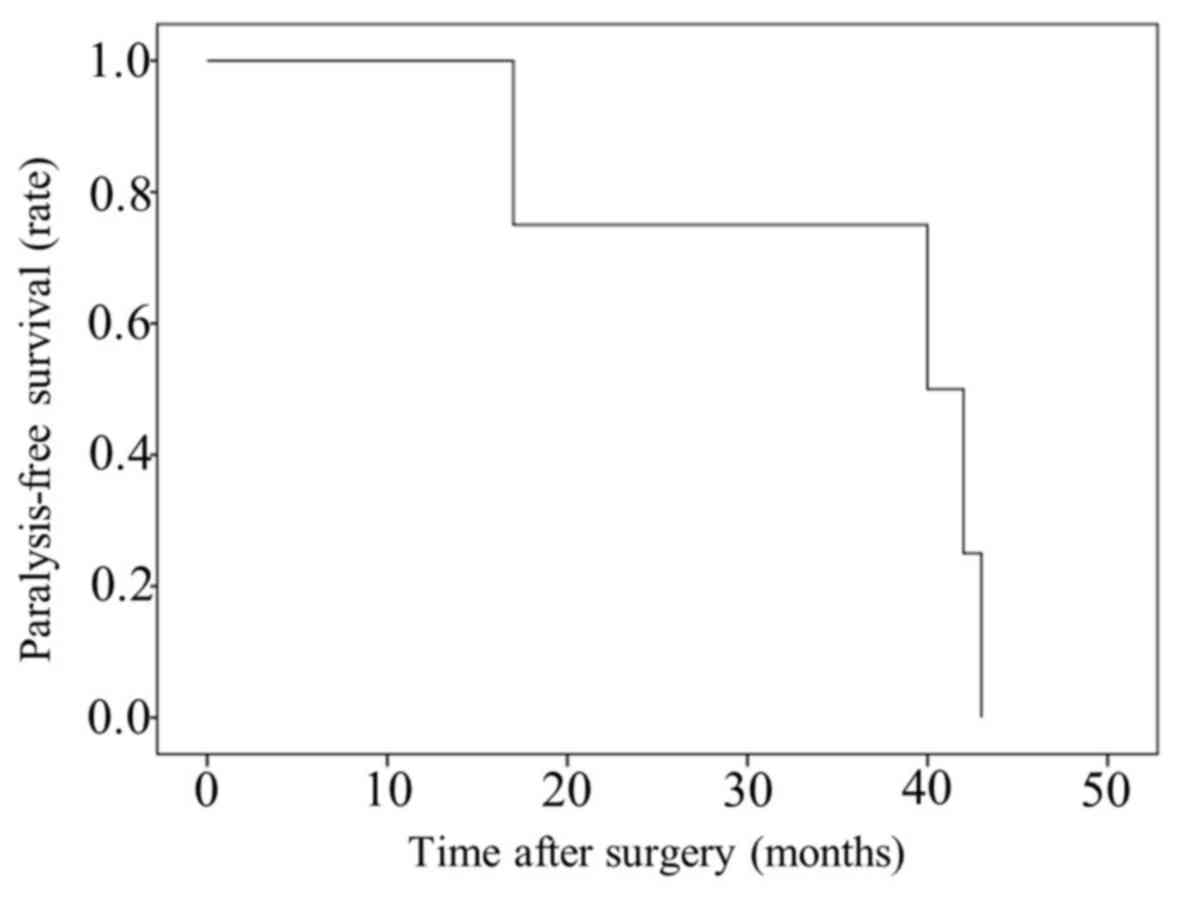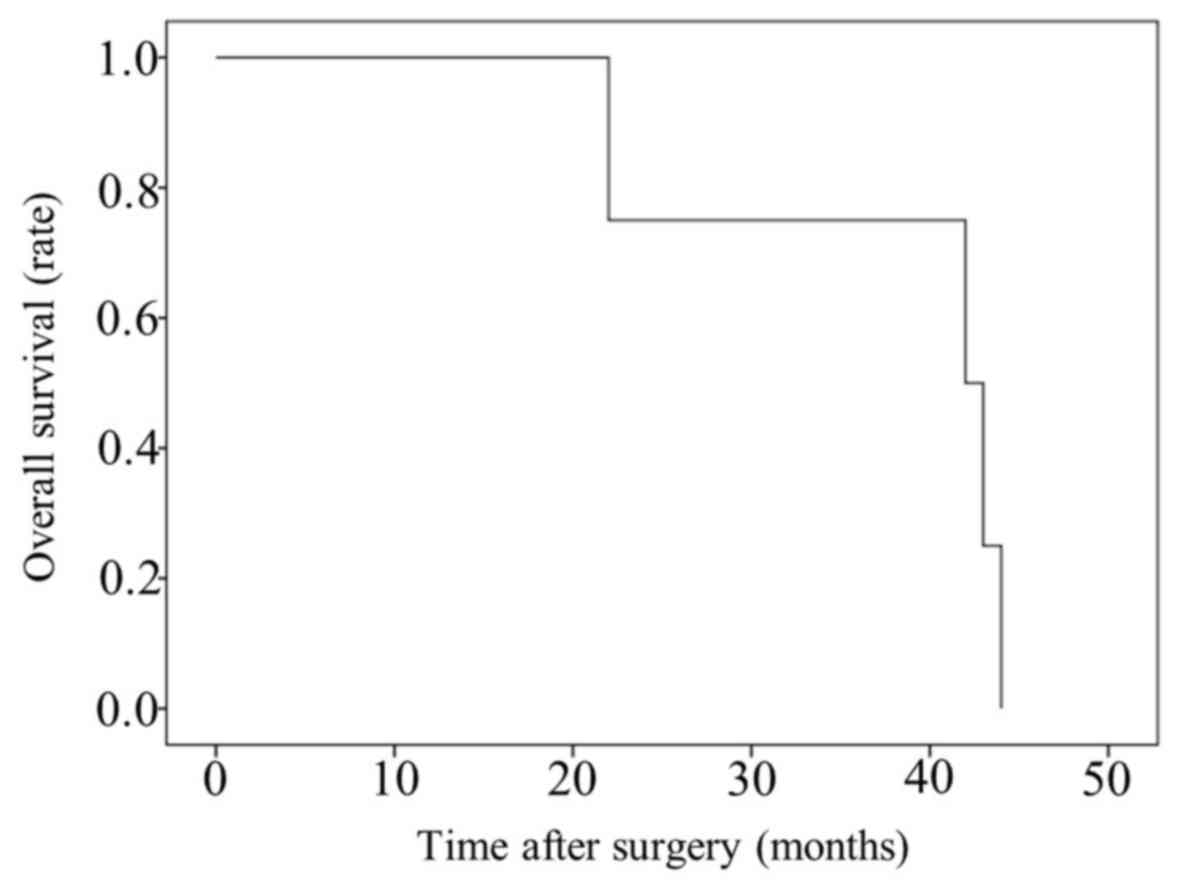|
1
|
Stewart BW and Wild CP: World Cancer
Report. IARC; Lyon: 2014
|
|
2
|
Silvestri GA, Tanoue LT, Margolis ML,
Barker J and Detterbeck F: American College of Chest Physicians:
The noninvasive staging of non-small cell lung cancer: The
guidelines. Chest. 123:(Suppl). 147S–156S. 2003. View Article : Google Scholar : PubMed/NCBI
|
|
3
|
Peters S, Weder W, Dafni U, Kerr KM,
Bubendorf L, Meldgaard P, O'Byrne KJ, Wrona A, Vansteenkiste J,
Felip E, et al: ETOP Lungscape Investigators: Lungscape: Resected
non-small-cell lung cancer outcome by clinical and pathological
parameters. J Thorac Oncol. 9:1675–1684. 2014. View Article : Google Scholar : PubMed/NCBI
|
|
4
|
Wong DA, Fornasier VL and MacNab I: Spinal
metastases: The obvious, the occult, and the impostors. Spine.
15:1–4. 1990. View Article : Google Scholar : PubMed/NCBI
|
|
5
|
Weigel B, Maghsudi M, Neumann C,
Kretschmer R, Müller FJ and Nerlich M: Surgical management of
symptomatic spinal metastases. Postoperative outcome and quality of
life. Spine. 24:2240–2246. 1999. View Article : Google Scholar : PubMed/NCBI
|
|
6
|
Schaberg J and Gainor BJ: A profile of
metastatic carcinoma of the spine. Spine. 10:19–20. 1985.
View Article : Google Scholar : PubMed/NCBI
|
|
7
|
Henry DH, Costa L, Goldwasser F, Hirsh V,
Hungria V, Prausova J, Scagliotti GV, Sleeboom H, Spencer A,
Vadhan-Raj S, et al: Randomized, double-blind study of denosumab
versus zoledronic acid in the treatment of bone metastases in
patients with advanced cancer (excluding breast and prostate
cancer) or multiple myeloma. J Clin Oncol. 29:1125–1132. 2011.
View Article : Google Scholar : PubMed/NCBI
|
|
8
|
Walker MP, Yaszemski MJ, Kim CW, Talac R
and Currier BL: Metastatic disease of the spine: Evaluation and
treatment. Clin Orthop Relat Res. 415:(Suppl). S165–S175. 2003.
View Article : Google Scholar
|
|
9
|
Tokuhashi Y, Matsuzaki H, Toriyama S,
Kawano H and Ohsaka S: Scoring system for the preoperative
evaluation of metastatic spine tumor prognosis. Spine.
15:1110–1113. 1990. View Article : Google Scholar : PubMed/NCBI
|
|
10
|
Tomita K, Kawahara N, Kobayashi T, Yoshida
A, Murakami H and Akamaru T: Surgical strategy for spinal
metastases. Spine. 26:298–306. 2001. View Article : Google Scholar : PubMed/NCBI
|
|
11
|
Frankel HL, Hancock DO, Hyslop G, Melzak
J, Michaelis LS, Ungar GH, Vernon JD and Walsh JJ: The value of
postural reduction in the initial management of closed injuries of
the spine with paraplegia and tetraplegia. I. Paraplegia.
7:179–192. 1969. View Article : Google Scholar : PubMed/NCBI
|
|
12
|
Coleman RE: Clinical features of
metastatic bone disease and risk of skeletal morbidity. Clin Cancer
Res. 12:6243s–6249s. 2006. View Article : Google Scholar : PubMed/NCBI
|
|
13
|
Tsuya A, Kurata T, Tamura K and Fukuoka M:
Skeletal metastases in non-small cell lung cancer: A retrospective
study. Lung Cancer. 57:229–232. 2007. View Article : Google Scholar : PubMed/NCBI
|
|
14
|
Deberne M, Ropert S, Billemont B, Daniel
C, Chapron J and Goldwasser F: Inaugural bone metastases in
non-small cell lung cancer: A specific prognostic entity? BMC
Cancer. 14:4162014. View Article : Google Scholar : PubMed/NCBI
|
|
15
|
Mok TS, Wu YL, Thongprasert S, Yang CH,
Chu DT, Saijo N, Sunpaweravong P, Han B, Margono B, Ichinose Y, et
al: Gefitinib or carboplatin-paclitaxel in pulmonary
adenocarcinoma. N Engl J Med. 361:947–957. 2009. View Article : Google Scholar : PubMed/NCBI
|
|
16
|
Mitsudomi T, Morita S, Yatabe Y, Negoro S,
Okamoto I, Tsurutani J, Seto T, Satouchi M, Tada H, Hirashima T, et
al: West Japan Oncology Group: Gefitinib versus cisplatin plus
docetaxel in patients with non-small-cell lung cancer harbouring
mutations of the epidermal growth factor receptor (WJTOG3405): An
open label, randomised phase 3 trial. Lancet Oncol. 11:121–128.
2010. View Article : Google Scholar : PubMed/NCBI
|
|
17
|
Maemondo M, Inoue A, Kobayashi K, Sugawara
S, Oizumi S, Isobe H, Gemma A, Harada M, Yoshizawa H, Kinoshita I,
et al: North-East Japan Study Group: Gefitinib or chemotherapy for
non-small-cell lung cancer with mutated EGFR. N Engl J Med.
362:2380–2388. 2010. View Article : Google Scholar : PubMed/NCBI
|
|
18
|
Decroisette C, Monnet I, Berard H, Quere
G, Le Caer H, Bota S, Audigier-Valette C, Geriniere L, Vernejoux JM
and Chouaid C: Groupe Français de Pneumo-Cancérologie 0601 Team:
Epidemiology and treatment costs of bone metastases from lung
cancer: A French prospective, observational, multicenter study
(GFPC 0601). J Thorac Oncol. 6:576–582. 2011. View Article : Google Scholar : PubMed/NCBI
|
|
19
|
Hessler C, Vettorazzi E, Madert J,
Bokemeyer C and Panse J: Actual and predicted survival time of
patients with spinal metastases of lung cancer: Evaluation of the
robustness of the Tokuhashi score. Spine. 36:983–989. 2011.
View Article : Google Scholar : PubMed/NCBI
|
|
20
|
Aoude AA and Amiot LP: Surgical treatment
of a patient with lung cancer metastasized to the spine with EGFR
mutation: A case report. Int J Surg Case Rep. 3:510–512. 2012.
View Article : Google Scholar : PubMed/NCBI
|
















